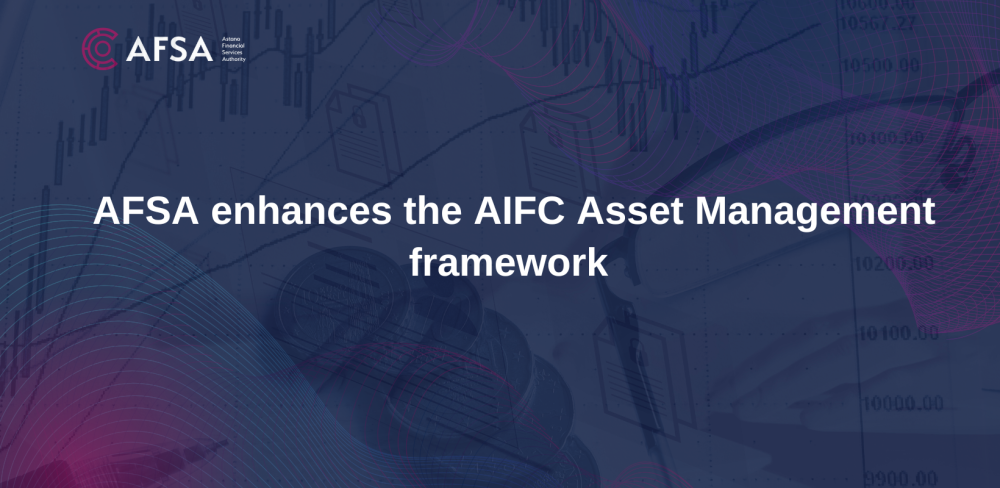
Considering the developments in the AIFC asset management sector and insights gained during the supervision of the regulated community the Astana Financial Services Authority (AFSA) has enacted the Amendments to the AIFC Asset Management Framework. This step is to further enhance the legislative framework governing investment funds or collective investment schemes in the AIFC and activities of the asset and fund managers operating in or from the AIFC.
AFSA has expanded the list of Specialist Funds available in the AIFC, to include Credit Funds[1], Digital Asset Funds[2], Exchange Traded Funds[3], Money Market Funds[4], Investment Token Funds[5] and Qualified Investment Token Funds. Due to the development of the AIFC asset management sector and the assessment of market needs, AFSA recognises the necessity to broaden the range of Specialist Funds available in the AIFC. This facilitates the diversification of investment options, empowering investors to tailor portfolios to specific sectors and strategies. Offering a comprehensive list of Specialist Funds not only gives a competitive advantage, but also aligns with global investment trends, demonstrating regulatory adaptability.
AFSA also enhanced the Venture Capital Fund framework to attract greater participation in the venture capital market by introducing amendments that broaden opportunities for investors. Currently, Venture Capital Funds are Exempt Domestic Funds focused on equity investments in early-stage unlisted businesses. The changes include allowing Venture Capital Funds to operate as Foreign Funds for Professional Clients, thereby attracting international investors; expanding investment options beyond equity to include securities and units of early-stage unlisted companies; and enabling funds to adopt a Master-Feeder structure[6] for greater diversification and efficiency.
The AIFC CIS Rules currently apply to Domestic Fund Managers, Foreign Fund Managers, and Centre Participants marketing Collective Investment Schemes in or from the AIFC. Since there has been confusion among stakeholders regarding whether Centre Participants must hold a license, to address this, the CIS Rules have been amended to clarify that Centre Participants refer to individuals or entities authorised by the AFSA to conduct relevant Regulated Activities.
The relevant amendments to the AIFC General Rules, AIFC Collective Investment Scheme Rules and Glossary are published on the AIFC website and will come into force on 1 January 2025.
Reference:
The Astana Financial Services Authority (AFSA) is the independent regulator of the Astana International Financial Centre (AIFC), which is established in accordance with the Constitutional Law of the Republic of Kazakhstan “On the Astana International Financial Centre” for the purposes of regulating financial services and related activities in the AIFC. AFSA administers the AIFC Regulations and Rules and is responsible for the authorisation, registration, recognition and supervision of financial firms and market institutions in the AIFC.
Over 3,500 firms from over 80 countries are registered in the AIFC. These firms provide banking, insurance, investment, professional and other services. The range of financial services offered at the AIFC is comparable to the list of services available in long-established financial centers of the world, such as London, Hong Kong, Singapore, Dubai and others. www.afsa.kz
The Astana International Financial Centre (AIFC) is an independent jurisdiction with a favourable legal and regulatory environment and a developed infrastructure for starting and doing business, attracting investment, creating jobs and developing Kazakhstan's economy. https://aifc.kz/
Contact information:
Public Relations and Communications Division of AFSA: +7 (717) 264 73 43; +7 7172 61-37-45 email: [email protected]z
[1] A Credit Fund is an investment vehicle that pools investor capital to provide financing through debt instruments, such as loans, bonds, and other fixed-income securities. This definition is provided for general understanding, while the official definition can be found in the AIFC Glossary.
[2] A Digital Asset Fund is an investment vehicle that pools capital from investors to allocate into digital assets. This definition is provided for general understanding, while the official definition can be found in the AIFC Glossary.
[3] An Exchange Traded Fund is a type of investment fund that is traded on stock exchanges, similar to stocks. It holds a diversified portfolio of assets, such as stocks, bonds, commodities, or other securities, and is designed to track the performance of a specific index, sector, or asset class. This definition is provided for general understanding, while the official definition can be found in the AIFC Glossary.
[4] A Money Market Fund is a type of investment fund that invests in short-term, low-risk, and highly liquid instruments. This definition is provided for general understanding, while the official definition can be found in the AIFC Glossary.
[5] An Investment Token Fund or Qualified Investment Token Fund is a Fund whose main purpose is investing in Investment Tokens or Qualified Investment Tokens respectively. This definition is provided for general understanding, while the official definition can be found in the AIFC Glossary.
[6] A Master-Feeder Structure is an investment fund arrangement where the "Master Fund" manages core investments and trading strategies, while one or more "Feeder Funds" gather capital from investors and allocate it to the Master Fund. This definition is provided for general understanding, while the official definition can be found in the AIFC Glossary.